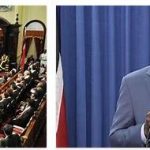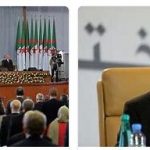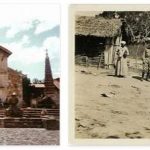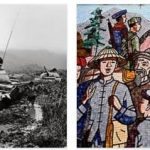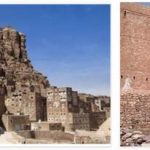Politics
According to the constitution of February 5, 2010, Angola is a presidential republic with a multi-party system. The president, who is elected for 5 years, acts as head of state, supreme executive body, commander-in-chief of the armed forces and chairman of the National Security Council. The top candidate of the party or alliance that became the strongest force in the parliamentary elections is elected president. According to loverists, the President has extensive powers and appoints the governors of the provinces and the judges of the Supreme Court. In the event of the President’s incapacity or death, the Vice-President acts as his successor. The legislature rests with the National Assembly (220 members, elected for 5 years).
National symbols
The flag is striped red over black, in the middle is a halved gear, a five-pointed star and a machete in yellow. The flag was first hoisted on November 11, 1975. The red color symbolizes the struggle for freedom, the black stripe stands for Africa and yellow for the treasures of nature. The star stands for the future, the gear wheel is a symbol for industry, the machete for agriculture. The points of the star are supposed to represent unity, freedom, justice, democracy and progress.
The coat of arms from the year of independence in 1975 was slightly modified in 1992. A hoe and machete symbolize work on a blue disk, underneath the rising sun for the new country, and above a gold star for internationalism and progress. The frame of the coat of arms consists of a segment of a golden gear wheel and containers made of corn, coffee and cotton, symbols for industry and agriculture. The open book symbolizes education and culture. Under the coat of arms is a golden ribbon with the words “República de Angola”.
The national holiday on November 11th commemorates the gaining of independence in 1975.
Parties
After the multi-party system was enshrined in the constitution in 1991, a wide range of parties and organizations emerged. Most influential parties: Movimento Popular de Libertação de Angola (MPLA; founded in 1956 as an independence movement) and União Nacional para a Independência Total de Angola (UNITA; founded 1966).
Unions
The largest unions are the MPLA-affiliated União Nacional dos Trabalhadores Angolanos – Confederação Sindical (UNTA-CS) and the Confederação Geral dos Sindicatos Independentes e Livres de Angola (CGSILA).
Military
The total strength of the conscription army (service period 24 months) is about 107,000 men. The army has 100,000 soldiers, the air force 6,000 and the navy 1,000 men. Paramilitary forces: 10,000 rapid police force.
Administration
Angola is administratively divided into 18 provinces, which have their own parliaments. The administration is headed by a governor appointed by the president.
Law
The legal system is mainly based on Portuguese law. Jurisdiction is exercised through the Supreme Court and lower collegiate courts, which are staffed with professional and lay judges with equal rights. The independence of the judiciary given by the constitution is limited by corruption and political influence. The death penalty was abolished in 1992.
Education
There is general compulsory schooling from 6 to 10 years of age. The school system is divided into a four-year elementary level and a secondary level with three types of school: three-year general schools, three-year specialist schools preparing for university attendance, and four-year vocational schools and technical colleges. In addition to the free public schools, there are private schools that charge tuition fees. In addition to the state university (founded in 1963), the higher education sector also includes a further 16 universities and 44 technical colleges as well as several teacher training institutes.
Media
After the peace agreement in 1991, independent media were also allowed. The freedom of the press is constitutionally enshrined, but state media still have a key position. Journalists critical of the government are repeatedly subjected to reprisals.
Press: The only daily newspaper is the »Jornal de Angola / Correio da Semana« (state). The few private weekly newspapers such as “Folha 8”, “A Capital”, “Actual”, “Agora” and “O Independente” appear irregularly in some cases.
News agency: »Agência Angola Press / ANGOP« is the only news agency (state).
Broadcasting: The state »Televisão Pública de Angola« (TPA) has existed since 1975. The first and so far only private broadcaster is »TV Zimbo« (founded in 2008). TV programs from Portugal (e.g. “RTP África”, “SIC Notícias”) and Brazil (e.g. “TV Globo Internacional”) are also received. »Rádio Nacional de Angola«, the national radio, broadcasts in Portuguese and ten national languages as well as in Spanish, English and French for foreign countries. There are also some private and two church radio stations: “Rádio Ecclesia” (Catholic) and “Rádio Kairós” (Methodist).

